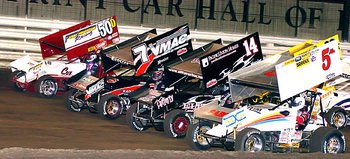Sprint car racing
Sprint cars are small, high-powered race cars designed primarily for the purpose of running on short dirt or paved tracks. Sprint car racing is most popular in the United States, but series also operate in Australia and New Zealand.
Sprint cars have a high power-to-weight ratio making sprint car racing exciting with speeds in excess of 140 miles per hour on some tracks. This speed often also makes it very dangerous. The safety record of sprint car racing in recent years has been greatly improved by the use of roll cages to protect the drivers. Wings have been mounted on top of the cars since the 1970s to give them sufficient downforce so as not to become airborn as readily as was previously the case. When cars went airborn, the wings would break off or absorb the impact of the flip, lessening the impact on the driver. In some cases, teams are able to replace the wing during the ensuing red flag and be able to race once the race resumed.
Many NASCAR drivers got their start in sprint car racing, including Jeff Gordon and Tony Stewart. As a challenging form of auto racing, sprint car racing is considered an excellent training ground for NASCAR series.
For a complete history of sprint car racing, the National Sprint Car Hall of Fame & Museum located in Knoxville, Iowa, USA features exhibits to highlight the history of both winged and non-wing sprint cars.
Non-winged Sprint Cars
There are two sanctioning bodies for non-winged sprint cars: the United States Automobile Club (USAC) and the Sprint Car Racing Association (SCRA). Sprint Car Racing Aassociation is an off-shoot of the earlier and venerable CRA or California Racing Association. USAC racing divisions include the Silver Crown series which race on both paved and dirt track, and the National Sprints Series of sprint cars and midgets.
Winged Sprint Cars
In the early 1970s, many sprint car drivers began to put wings with sideboards on both the front and top of their cars. The added wings increased the downforce generated on the car, with the opposite direction of the sideboards helping to turn the car in the corners.
With the addition of wings, a new sanctioning body and touring series to promote the sport was founded. In 1978, Ted Johnson formed the leading promotional body for winged sprints car called the World of Outlaws. Racing throughout the United States from March to November, the World of Outlaws is the premier dirt sprint car racing series. Famous tracks featured in the series included the Eldora Speedway in Rossburg, Ohio, the Knoxville Raceway in Knoxville, Iowa and Williams Grove Speedway in Mechanicsburg, Pennsylvania. Each August, the Knoxville Raceway holds the paramount sprint car event, the Knoxville Nationals.
Despite the availability of advertising exposure on the wings, there was little live television coverage, compared to the non-winged cars, which had an ESPN contract with the United States Automobile Club.
The first national live television deals with winged sprint cars came on The Nashville Network (TNN) in 1992-93 and again in 1993-94 with a winter-based series in Arizona, which featured top motorsports commentator Mike Joy calling the action.
Live coverage of the Knoxville Nationals on The Nashville Network began in 1995. A year later, a next-day tape deal with CBS for one race at Eldora Speedway aired while TNN coverage expanded. By 2000, CBS (which owned TNN at the time) announced TNN would air 15 live events, including the King's Royal at Eldora Speedway and the Knoxville Nationals.
By the 2001 season, plans were to cover 18 live races, but midway through the season MTV Networks closed the CBS motorsports operations. This move relegated the remainder of the World of Outlaws season to tape delay races. The seven year partnership, which gave the sport live exposure, and damaged the sport's image.
A tape delayed deal with the SPEED Channel followed for the next season.
Television coverage began on the The Outdoor Channel in 2003. Events are usually tape delayed for two weeks or more. The Knoxville Nationals were on Speed Channel. The 2005 Knoxville Nationals did not air as rain postponed the event, and there was not enough space for Speed to air the event.
In 2003, Johnson sold his organization to DIRT Motorsports.
The National Sprint Tour was formed as a rival to the World of Outlaws for the 2006 season. The series was formed by Brownfield Promotions. Notable teams in the NST include Steve Kinser Racing (#11), Roth Motorsports (sometimes known as the "Beef Packers" team) (#83), Tony Stewart Racing (#20). After Brownfield Promotions' patriarch Fred Brownfield was killed in a crash, Kinser and principals of two other teams purchased the NST. Stewart, while in the NST, still has his track (Eldora Speedway) in the rival World of Outlaws, although that may change.
1970 Lloyd Shores Sprint Car Chassis
- 1970 Lloyd Shores Sprint Car Chassis 1.jpg
- 1970 Lloyd Shores Sprint Car Chassis 2.jpg
- 1970 Lloyd Shores Sprint Car Chassis 3.jpg
- 1970 Lloyd Shores Sprint Car Chassis 5.jpg
- 1970 Lloyd Shores Sprint Car Chassis 6.jpg
- 1970 Lloyd Shores Sprint Car Chassis 7.jpg
- 1970 Lloyd Shores Sprint Car Chassis 8.jpg
- 1970 Lloyd Shores Sprint Car Chassis 9.jpg
See also
- List of National Sprint Car Hall of Fame inductees
- National Sprint Car Hall of Fame & Museum
- World of Outlaws
- National Sprint Tour
